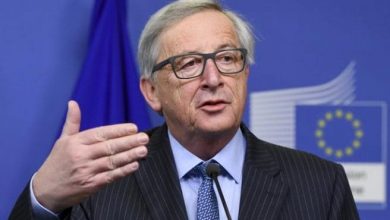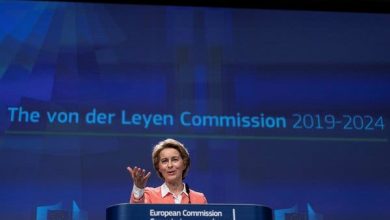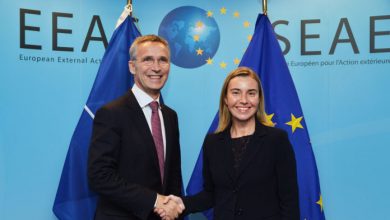With the German Presidency Steering the Ship, Where Is EU Leadership Headed?

In times of crisis, people rally behind leaders who emerge, most often mirroring their own characteristics. Churchill channelled British steadfastness and resolve to survive the Blitz, De Gaulle French pride to restore the country’s will after its defeat in the war. Angela Merkel’s pirouette, joining with Emmanuel Macron in the proposed new Eurobond financing of what has become a three-quarters of a trillion Euro coronavirus relief package, is a clear statement by two European leaders who have sought to respond to the challenges of the times. Merkel brings the qualities of German patience and deliberateness to the fore with Emmanuel Macron’s visionary ambitions for Europe.
Germany has just taken up the mantle of a six-month rotating Council of Ministers Presidency this past July, in what promises to be a momentous time for Europe. The challenges of the virus, economic collapse, Chinese ambitions and American disarray demand a new cap for the European ship of state. What can we hope to see from this German Presidency, and what can we expect to see from European leaders in light of these challenges?
An Augean Challenge
There are several challenges for the German Presidency which will test Merkel’s mettle, her political alliances and the will of the European population to survive the crisis together or fail separately. The first and most immediate challenge, now overcome, was the unanimous approval of the budget and the Eurobonds that had been proposed to pay for the trillion-euro plus relief and budgetary package.
Calling themselves the “Frugal Four”, Austria, Sweden, Denmark and the Netherlands early on indicated their opposition to Eurobond financing, though not to relief loans. Equal measures of pressure and concessions on budget rebates, though, prevented the unique one “no” vote sufficient to scuttle the whole package. To achieve this, some concessions had to be made on the Hungarian and Polish front, setting aside concerns over the rule of law and political differences.
It was certainly a relief to France and Germany at the start of the process, in spite of other regrets they may have, that a less than communal oriented UK is no longer a voting member. This is not an observation unique to us. In the May 30 edition of the UK weekly The Economist, one of their regular staff writers speculated that even under a Cameron government the UK would have vetoed the budget with Eurobonds and a relief package included. The unwieldiness of unanimous voting in a community of 27, not to mention 28 before the UK left, is clear when major reforms like this one are needed.

The second step for Merkel’s Presidency will be one over which she has no direct control: getting the budget through Parliament. There are issues with research and the Parliament will want to put their own stamp on things, but after compromises agreement is anticipated.
That brings us to the third issue for the six-month German Presidency: institutional reforms. A reform conference on the future of the Union that was scheduled to begin in May has been postponed sine die. The conference is needed and will in all likelihood be rescheduled. Will it be too much for Merkel to handle the pressing needs of the economic and health crisis as well as build consensus around further reform? Or will she see the crisis as an opportunity to push through an ambitious agenda?
Beyond German Leadership: EU Leaders to the Fore
Much of managing a 445 million member community is highly technical in nature. Leadership must demonstrate technical competence as well as personal character. Paying for the huge sums necessary to redress the economic and social issues caused by the virus will be an enduring problem. Christine Lagarde – though attacked for some early faux pas’s in initially addressing the crisis – has the experience and competence as well as character to do what is necessary at the European Central Bank.
No one can ignore the important role Donald Tusk, head of the European People’s Party in the European Parliament, can play. Of Polish (specifically Kashubian) origin, born in a working-class family in Gdansk, Tusk has taken upon himself the task of neutralising the populist political and cultural revolt. This will certainly be key to progress in a European federation, as populist parties have generally been determined nationalists rejecting federalism.
Another emerging leader is the head or the Progressive Alliance of Socialists and Democrats in the EU Parliament, Irate Garcia. She has already been responsible for several important portfolios, notably concerning women and the family, and will continue to play an important role.
Leadership will also emerge from beyond the institutions and from places we might not always expect. George Soros, head of the Open Society Foundation, an NGO founded and financed by him and working on supporting democratic institutions in Eastern Europe is no stranger to European finance. He is also the founder of the Central European University (CEU) recently forced, for having come afoul of the Hungarian Government, to move from Budapest to Vienna. Soros made his fortune, now used philanthropically, as an investor and speculator in currencies, stocks, and bonds. These are markets he knows well and the precise markets which will be needed to finance the Eurobonds. Soros has proposed a novel but not untried idea for low-cost financing of the crisis response: perpetual bonds.

Perpetual Bonds – A Radical Solution?
In 1648, Holland faced an existential threat from rising seawater. A Dutch Water Board issued the first “perpetual” bonds to pay for the building of a massive system of dikes. Now, 350 years later, the bonds are still paying interest to the remaining holders, but they have been forgotten by almost everyone else.
Similar bonds, also known as consols, have been successfully used for financing during several crises since the Dutch issuance. The first British Consols were issued in 1751. In 1927, under Prime Minister Winston Churchill, consols were issued again as partial refunding of the 1917 National War Bonds. The UK has a long history of using consols for financing.
The mechanism is simple: perpetual bonds pay interest but the principal is never repaid. Let’s say an investor buys a 10.000 euro perpetual bond at 1% interest – these bonds have been in the past subscribed to at very low interest rates because they pay in perpetuity. The holder would receive 100 euros per year for the rest of his life, at which time the bonds could be passed to his or her heirs. There is no end to this stream of 100 Euro income to the holder.
Perpetual bonds are less costly in the immediate future, the ideal feature in times of crisis when much money is required. However, they are considerably more expensive in the long run, though for the first 100 years or thereabouts depending on their interest rate they would be less expensive than an equivalent bond.
There are further ways that the costs can be curtailed over time. There is the natural attrition of bonds being lost with death and the transfer of estates. In times of inflation, payments become worth less in real terms naturally reducing their real cost. Costs can further be reduced by offering a buyout of remaining bonds, especially if inflation is such that return to the holders has diminished. This was the case with the 1751 British Consols which were bought out and retired in 2015.
One reason why more countries have not used consol financing is that, in order for the bonds to be subscribed to at a reasonable rate, the credit standing of the country must be good. This feature should appeal to the more frugal countries, as the issuance of such bonds will oblige the EU to keep its finances in order and revenues in line with expenditures. All in all, the proposal seems like an excellent way to provide low-cost Eurobonds in a time of crisis.
Where To From Here?
Spain has already proposed consols to the Council, but the proposal was not fully vetted as it came at a time when there was no agreement to use Eurobonds of any type, whether perpetual or ordinary term bonds. Now that has changed with the French and German proposal and Council approval of mutual Eurobonds backed by the credit of the EU.
The German Presidency will have to face these and many other issues and ideas. A new leadership, if not new leaders, will have to emerge to meet these huge challenges. It is difficult to be a leader today as 24/7 media coverage will eventually show off anyone’s foibles in a poor light. But make no mistake, there are real leaders. The question is not so much whether Europe will find the leaders it needs, nor the solutions to today’s challenges, but whether it will find the followers.





